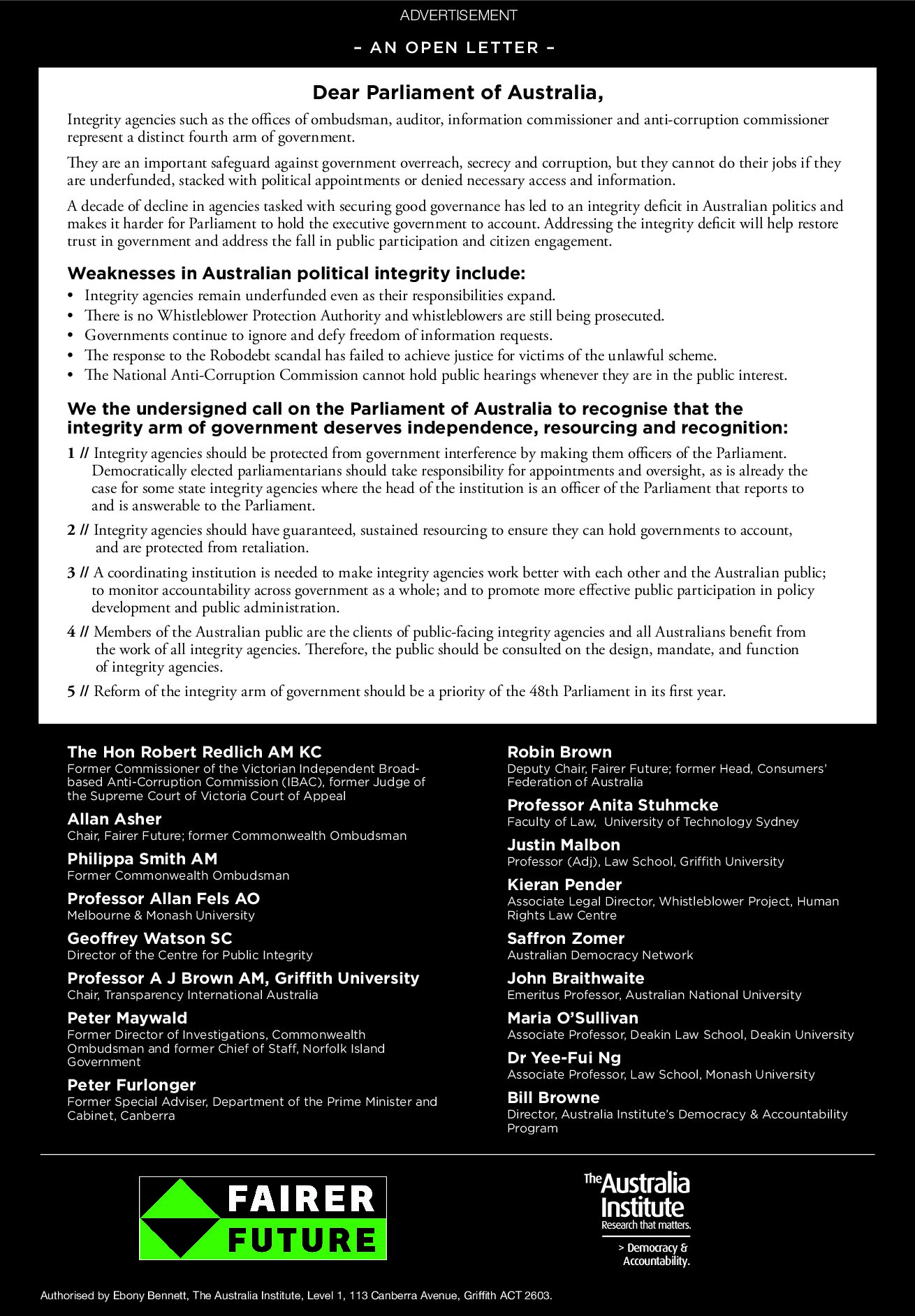Opening Remarks: Climate Integrity Summit | Richard Denniss

If we wanted to fix these things, we could. If you think that we need some complicated policy measure or some very expensive investment, you’ve been misled.
Thank you for that warm welcome to country and thank you all for coming today. It really is wonderful. This is the second time the Australia Institute’s put on the Climate Integrity Summit, and next year we’re going to have to think about bigger venues and maybe even two days to jam it all in. I promise you this is a wonderful problem to have when you run a think tank and people are so keen to come and think with you. So look around, you’re in a warm crowd. Look, it’s so important that we meet today to talk about these issues we’re more than truly halfway through this government’s third year term, and most people would agree that at the last election, the three issues that dominated the election were separately climate integrity and the role of women in Australian democracy and indeed the treatment of women in Australia.
What we’re talking about today is the bringing together of two of those key themes, climate and integrity, because so much of our so-called climate policy, so much of our so-called climate debate, frankly lacks that integrity. And until we insist on integrity in our debate and in our policy, then frankly we’re never going to be able to tackle climate change. So I’m really proud that we’re here at the second Climate Integrity Summit. I’m really proud that so many people are interested in the issue and hopefully at the end of the day, perhaps a lot of us can even agree what a system of climate policies that were based on integrity might look like. But even if we can’t agree on all the policies, hopefully we can agree on the science and the need for integrity and the debate about that science. So let me just start with what we do know. Apologies, I’m an economist. I know people like to get out of bed early in the morning to hear from economists, but there’s not enough economics in Australian public debate is there. I feel very underrepresented as a profession.
Climate change is no accident
So I’ll talk briefly about economics, but first I just want to talk about what the science says. The science says and has told us for decades that we’re burning too many fossil fuels and that unless we stop burning fossil fuels, we’re going to warm our entire planet. This is quite a task we’ve set ourselves, heating up an entire planet. But we’re an ambitious little country down here in Australia and as the third biggest fossil fuel exporter in the world, we’re keen to play our part it seems in that international project to warm an entire planet.

Well, you laugh, but these things don’t happen by accident. We didn’t accidentally subsidise the fossil fuel industry. We didn’t accidentally spend $80 billion on gas export hubs in Queensland. The same year the world met in Paris, this government didn’t accidentally spend one and a half billion dollars in its first budget on a new subsidy for a new gas project in middle arm in Darwin. It takes effort, it takes money, it takes time.
It takes resolve to cause climate change.
We can’t pretend that we don’t know what the science says and we shouldn’t look away from what Australia is in the middle of doing. So we’ll hear a lot today about what Australia could do and what Australia should do. But I want to make sure that we all understand what the science says, which is that if, and it’s a big if to democracy, we can do whatever we want. But if we want to tackle climate change, the science says we need to stop burning fossil fuels and – underline full caps – and stop chopping down trees and sequester soil, sequester carbon in the soil. And the science doesn’t say it’s okay to keep drilling for oil and gas if we don’t chop a tree down. That’s not science and it’s not actually economics. It’s just a complete lack of integrity in our debate and our policies about climate change.
The six principles for evaluating climate integrity
So last year at this summit, Polly Hemming, who will speak to you today, Australian Institute’s Climate Director, spelled out six principles, six principles for evaluating whether climate policy has integrity. I’m just going to go through them really quickly. First, principle climate policy should be simple. Why should it be simple? Well, because we need to reduce fossil fuel emissions and we need to stop chopping down trees. If you can’t understand the policy and if you can’t see how the policy makes those things happen, then we’re failing. Needs to be science-based. The only reason to tackle climate change, the only reason to reduce emissions is you believe the science. So if the science says you have to reduce emissions in a big hurry, why would you say it’s okay to just do a little bit? We need our climate policy to be independent. We need to get the conflicts of interest out of those advising on and enforcing climate policy.
We need decisions to be transparent. We have FOI laws, but they’re a joke. We have parliamentary procedures that can insist on documents. They’re widely ignored. We need government to drive action. Of course, business has a role to play. Of course, business has a role to play. Of course, individuals have a role to play. But the reason that climate change was called the biggest market failure in the world by Nicholas Stern, market failure, markets can’t fix market failure. See, I’m sounding like an economist already. When there’s market failure, it means the government has to intervene. We’ve created this topsy-turvy world where we are apparently going to solve market failure with market forces. That’s not economics, that’s just nonsense. And finally, we need to be conservative. Let me just confess that I’m happy to overreact to climate change.
You can’t overreact to climate change
I’m not so worried about getting the balance just right, that we stop just enough ice melting, that we save just the right number of voters. I actually think we should just stop doing something that dangerous. I think that we should be conservative when we look at the risks of climate change. Now we are here in Australia, we’re in one of the richest countries in the world living at one of the richest points in world history. We’re very lucky. But not all of us here today are rich and not all of us here, I’m proud to say, are from Australia. We’re going to hear a broader perspective. But let’s be clear. In a rich country like Australia, we waste a lot of money on avoiding risks that are a lot smaller than climate change. I don’t know about you, but I insure my house and car and at the end of each year when the bill comes in next year, I don’t think, oh, idiot, wasted my money, I didn’t crash my car. I massively overreact to the risk of crashing my car or my house burning down by doing something really conservative, like taking out insurance and being happy when the bad thing doesn’t happen.
This is not a radical way to act, but we’re told as a nation state that let’s not overreact to these fears of climate change. Imagine how silly we’d feel if we accidentally cleaned up the air and cleaned up the water and cleaned up our cities. I know it’s horrible, isn’t it? Right? But this is the absurdity. This is the lack of integrity in our climate debate that we don’t want to go too far when we’re doing nothing. Australia’s got a hundred new fossil fuel projects waiting for approval. There’s no chance of overreacting, I promise you that. So again, here we sit in one of the richest countries in the world at the richest point in world history. So rich, so rich that when it turned out we needed to spend $370 billion on some nuclear subs. No, that’s how good it is to be rich. $370 billion, sure. Worried about the budget. Nah, why not? Well, according to former treasurer Josh Frydenberg, when he was asked, because if it’s a priority, you can always afford it. No, that’s economics.
That’s economics. You live in one of the richest countries in the world and your government wants to drop a lazy $370 bill on nuclear submarines. They probably won’t cause world peace, but they could come in handy one day. And isn’t it good to live in a country that’s so rich that it can afford to take such expensive precautions against unlikely things that our nuclear subs will be necessary? Indeed, we have an entire military for the unlikely outcome that someone might try to invade us. Hey, it pays to plan ahead. It’s good to be cautious, except when it comes to climate change.
The idea that climate change is some sort of radically difficult democratic problem because the costs are upfront and the benefits are in the future, and it’s all a bit uncertain. How could a democracy cope, I don’t know, subs didn’t seem that hard. If we wanted to fix these things, we could. And if you tell yourself it’s harder than that, you’re not going to put the pressure on the people who could fix it. If you think that we need some complicated policy measure or some very expensive investment, you’ve been misled.
We’re rich. Not all countries are as rich as ours. We’re so rich that we can actually spend a fortune, a fortune every year buying really large four wheel drives in case we go camping, right? Not you, but the person sitting next to you is capable of doing some pretty crazy stuff. And we need to own that. We need to own that. We need to see that of all the contingencies we are planning for in Australia, it’s the unlikely risk of camping, it’s the need for nuclear submarines, it’s the risk of running over time. Thank you very much.
— Richard Denniss, Executive Director of the Australia Institute, at the Climate Integrity Summit 2024
Between the Lines Newsletter
The biggest stories and the best analysis from the team at the Australia Institute, delivered to your inbox every fortnight.
You might also like
Open letter calls on newly elected Parliament to introduce Whistleblower Protection Authority, sustained funding for integrity agencies to protect from government pressure.
Integrity experts, including former judges, ombudsmen and leading academics, have signed an open letter, coordinated by The Australia Institute and Fairer Future and published today in The Canberra Times, calling on the newly elected Parliament of Australia to address weaknesses in Australian political integrity. The open letter warns that a decade of decline in agencies
Our crisis of integrity looms in the Pacific
“An Albanese Labor government will restore Australia’s climate leadership, and listen and act on Pacific island warnings of the existential threat of climate change.” Despite a clear election campaign commitment to listen to Pacific Island nations and act on climate change, the Australian government continues to enable and encourage new and expanded fossil fuel projects. When it
The role of the whistleblower in pursuit of climate integrity
Whistleblowers are critical to addressing the climate and biodiversity crises.


